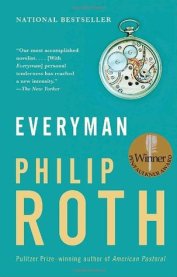Philip Roth, toward the end of his writing career (and life; he battled many health problems), wrote a number of short novels. Everyman, which focuses on aging, sickness, regret, and death, is one of the grimmest.
The novel opens at the protagonist’s funeral, then cycles back and tells the story of his life: he gave up the dream of being an artist to work as an advertising man. He was married three times, the last one to a model half his age, and destroyed each marriage. He had two estranged sons. One daughter from his second marriage who still loved him. A litany of illnesses as he ages. Abundant regrets.
A few quotes sum up the novel:
True, he had chosen to live alone, but not unbearably alone. The worst of being unbearably alone was that you had to bear it—either that or you were sunk. You had to work hard to prevent your mind from sabotaging you by its looking back at the superabundant past.
How long could he watch the tides flood in and roll out without remembering, as anyone might in a sea-gazing reverie, that life had been give to him, as to all, randomly, fortuitously, and but once, and for no known or knowable reason?
Old age isn’t a battle; old age is a massacre.
You might wonder what is the purpose of reading such a novel. First, Roth was one of the finest writers of his generation, having won almost every fiction prize possible other than the Nobel. Second, novels like this are instructive and force us to take measure of our own lives, to face our own regrets, to accept our own impending fate—and also give us opportunities to make needed changes, invite us to think differently, and to appreciate life while we still have it.
At 182 pages, Everyman packs a lot of power.
4/5 Stars


